Leveling Up
The Journey of a D&D Character's Growth
2/6/20255 min read


In Dungeons & Dragons, leveling up isn’t just about gaining new numbers on a character sheet—it’s about growth, learning, and personal transformation. While the mechanics of leveling up are simple (increase hit points, gain new abilities, maybe boost some stats), the real fun comes from weaving these changes into the story. How does a fighter get better at fighting? Where does a rogue pick up their new tricks? Why does a wizard suddenly know how to cast fireball?
This essay explores how different classes might experience leveling up in a way that feels immersive and satisfying. Whether it's through training, divine intervention, or sheer force of will, every character's journey is unique.
The Fighter: Blood, Sweat, and Drills
Fighters are defined by their dedication to combat. Whether they favor the precision of a fencer, the brute strength of a greatsword-wielding warrior, or the tactical expertise of a battlefield commander, their skills are honed through rigorous practice.
When a fighter levels up, they don’t just magically get stronger overnight. Instead, they likely return to training, either on their own or under the guidance of a mentor.
Example:
After a long and grueling campaign against a horde of goblins, Roderic, a human fighter, finds himself at a crossroads. He’s gotten better—stronger, faster—but he knows that his enemies are only going to get tougher. He makes a decision: he needs guidance.
Returning to the city of Westhaven, Roderic seeks out his old mentor, Sir Darion, a retired knight known for his brutal training regimens. Under Darion’s watchful eye, Roderic spends weeks refining his technique. He spars with training dummies, fights against fellow warriors, and pushes his body to its limits. He learns how to reposition in combat, how to strike with greater efficiency, and how to wield a shield more effectively.
By the time he leaves, his skills are sharper, his reflexes faster. He is no longer the same warrior who stumbled into Westhaven weeks ago. He has leveled up.
The Rogue: Learning New Tricks
Rogues thrive on cunning and adaptability. Whether they are thieves, assassins, or spies, their skills evolve based on the challenges they face. Unlike a fighter who trains in structured combat, a rogue’s education is more... unconventional.
Example:
Sylva, an elven rogue, has spent the past few weeks navigating the underground politics of the city’s thieves’ guild. She’s completed a few jobs, picked a few pockets, and made a name for herself. But she wants to get better.
One night, she hears whispers of an infamous master thief known only as "The Shade" who operates within the city. Determined to learn from the best, she tracks down the elusive figure. After proving her worth through a series of increasingly difficult challenges—breaking into a noble’s vault, escaping from a locked room, and even bluffing her way past the city guard—The Shade finally acknowledges her skill.
Under his guidance, Sylva learns new techniques: how to vanish into the shadows more effectively, how to strike with deadly precision, and how to manipulate people more easily. Her reflexes become sharper, her blade strikes truer.
By the time she parts ways with The Shade, she has become something greater than before. She has leveled up.
The Wizard: Arcane Study and Experimentation
A wizard’s power doesn’t come from training in the traditional sense—it comes from knowledge. To gain new spells and abilities, a wizard must research, experiment, and push the limits of their intellect.
Example:
Eldrin, a young wizard, has spent months adventuring through the wilds, battling monsters and uncovering lost relics. His spellbook is filled with arcane formulas, but he hungers for more.
Returning to his master, an old and eccentric mage named Archmage Valeria, Eldrin presents his findings. Valeria, amused by his progress, agrees to teach him more advanced spells—but only if he can prove he’s ready.
For the next several weeks, Eldrin pores over ancient tomes, decoding lost incantations and experimenting with magical energies. He learns to manipulate fire with greater precision, to weave illusions that can fool even the keenest eyes, and to summon forth shields of arcane energy.
After hours of study, sleepless nights, and a few minor explosions, Eldrin finally understands the intricacies of the new magic. He is no longer just a student—he is becoming a master in his own right. He has leveled up.
The Cleric: Divine Revelation and Service
Clerics don’t just become stronger through training or study. Their power comes from their connection to their deity, and leveling up often represents a deepening of that bond.
Example:
Sister Marianne, a devoted cleric of Pelor, has spent weeks tending to the sick and wounded in a plague-ridden village. She prays daily, seeking guidance from her god. One night, as she meditates in the ruined temple, she feels something shift—a warmth fills her soul, and a voice, distant yet familiar, whispers to her.
In that moment, she receives a vision of a lost relic hidden deep within a forgotten crypt. The vision grants her insight into new divine magic, bolstering her faith and imbuing her with new strength.
The next day, she awakens with a newfound understanding of her divine power. Her prayers are answered more swiftly, her healing magic more potent. She has grown in faith, and in turn, Pelor has blessed her. She has leveled up.
The Warlock: A Dark Bargain
Warlocks gain their power from a pact with an otherworldly patron. Unlike wizards who study magic, warlocks are granted their abilities—though not always without a price.
Example:
Vaelin, a warlock bound to a shadowy entity known as The Whispering One, has been feeling a pull in his mind—a compulsion to journey to an abandoned tower in the middle of a forsaken swamp. He resists at first, but the whispers grow louder, until he can ignore them no longer.
In the dead of night, he arrives at the tower. Inside, a spectral figure materializes before him—a messenger of his patron. The figure speaks in a voice that sends shivers down his spine:
"Your service has been noted. Your hunger for power is acknowledged. Take what is offered."
Before him, a dark tome appears, its pages filled with forbidden knowledge. As he reads, the words burn into his mind, searing his very soul. He feels his magic deepen, his connection to his patron grow stronger. New spells etch themselves into his thoughts—dark, powerful, and terrible.
When he leaves the tower, he is changed. He has leveled up.
Conclusion: Growth Through Experience
No matter the class, leveling up isn’t just about crunching numbers—it’s about storytelling. A barbarian doesn’t just get stronger; they push themselves to their physical limits. A bard doesn’t just learn new songs; they seek out inspiration from the world around them. A druid doesn’t just wake up with new spells; they spend time meditating with nature, listening to its secrets.
Each level-up represents a moment of transformation, a step on the journey from a simple adventurer to a legend. By tying these moments into the narrative, players can make their characters feel more alive, turning what could be a mechanical process into a meaningful part of the story.
So next time your character levels up, ask yourself: How did they earn this? What changed? What did they have to overcome?
That’s where the real magic happens.
Mage Scroll © 2025. All rights reserved.
